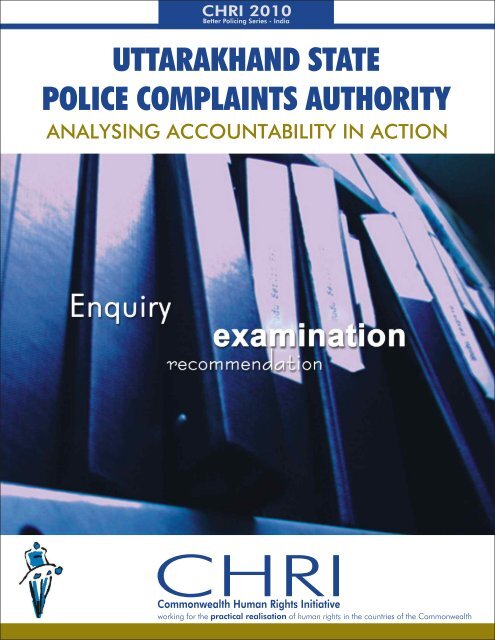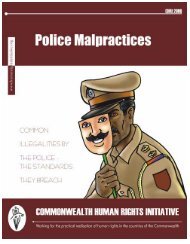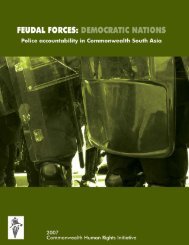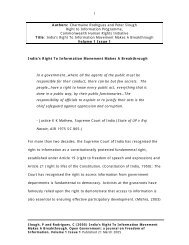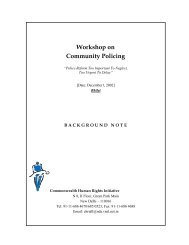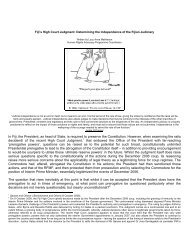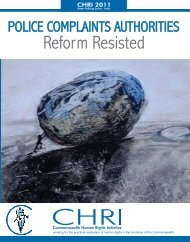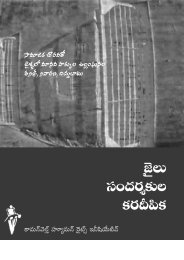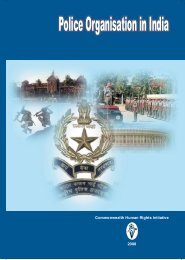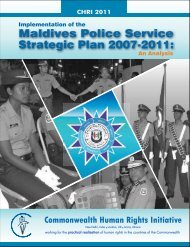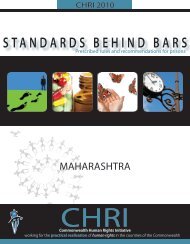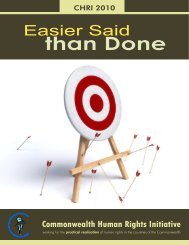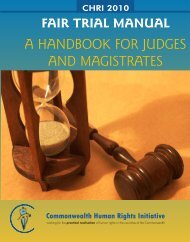Uttarakhand State Police Complaints Authority - Commonwealth ...
Uttarakhand State Police Complaints Authority - Commonwealth ...
Uttarakhand State Police Complaints Authority - Commonwealth ...
You also want an ePaper? Increase the reach of your titles
YUMPU automatically turns print PDFs into web optimized ePapers that Google loves.
UTTARAKHAND STATEPOLICE COMPLAINTS AUTHORITYANALYSING ACCOUNTABILITY IN ACTIONWritten By:Navaz KotwalSharan SrinivasEdited By:Devika PrasadCHRI 2010This report and the accompanying research and dissemination have been made possiblewith the financial support of the British High Commission, New Delhi.COMPLAINTS AUTHORITY 3
TABLE OF CONTENTSChapter 1: Introduction ....................................................................................61.1 Background ................................................................................71.2 The <strong>Uttarakhand</strong> <strong>Police</strong>: Strength, Statistics and Misconduct .............8Chapter2: The <strong>Police</strong> <strong>Complaints</strong> <strong>Authority</strong> in <strong>Uttarakhand</strong> ............................102.1 Composition .............................................................................112.2 Staff ........................................................................................122.3 Rule-Making Powers .................................................................122.4 Mandate ..................................................................................132.5 Powers .....................................................................................142.6 Offices and Funding ..................................................................142.7 Tenure ......................................................................................152.8 Outreach ..................................................................................152.9 Cooperation from the <strong>Police</strong> .......................................................16Chapter 3: The Working of the <strong>Authority</strong>: An Analysis .....................................183.1 Profile of the Complainants ........................................................193.2 Profile of the <strong>Complaints</strong> Received ...............................................203.3 Procedure followed by the <strong>Authority</strong> ............................................24Chapter 4: The <strong>Authority</strong>’s Orders: A Brief Summary .......................................284.1 Trend of Disposal of <strong>Complaints</strong> ..................................................304.2 The <strong>Authority</strong>’s Inquiries ............................................................31Chapter 6: Where to From Here? ....................................................................346.1 Conclusion ..............................................................................356.2 Recommendations ....................................................................356.2.1 Independent Investigators .................................................356.2.2 Publicity ..........................................................................366.2.3 Action on <strong>Complaints</strong> ......................................................366.2.4 Speedy Disposal of <strong>Complaints</strong> ..........................................376.2.5 Transparency and Openness .............................................376.2.6 Rule-Making Powers .........................................................376.2.7 Annual Report .................................................................376.2.8 Working Relationship with the <strong>Police</strong> ...................................386.2.9 Obligatory Nature of Recommendations .............................38Annexure: <strong>Uttarakhand</strong> <strong>Police</strong> Act .................................................................39Endnotes ........................................................................................................44COMPLAINTS AUTHORITY 5
CHAPTER 1INTRODUCTIONToday, the ways in which the police handle complaints in relation tothemselves is an area of great weakness within the institution. While thepolice say that there is a great deal of disciplining, dismissal, salaryreduction, transfer and punishment that takes place in its ranks – muchmore than in other services – the public at large is convinced that apoliceman can get away with anything – from being rude, unresponsiveand negligent, to being corrupt and murderous. Refusal to file complaintsor come to the aid of the public is a major grouse. Another is illegalarbitrary and unnecessary arrests.6 COMPLAINTS AUTHORITY
BackgroundToday, the ways in which the police handle complaints in relation to themselves is an area of greatweakness within the institution. While the police say that there is a great deal of disciplining, dismissal,salary reduction, transfer and punishment that takes place in its ranks – much more than in otherservices – the public at large is convinced that a policeman can get away with anything – from beingrude, unresponsive and negligent, to being corrupt and murderous. Refusal to file complaints or cometo the aid of the public is a major grouse. Another is illegal arbitrary and unnecessary arrests. Thisovercrowds our jails with poor and indigent petty offenders while affluent wrongdoers roam at large,unmindful of the police or because of them. Extortion, intimidation and allegations of violence andmistreatment in custody are too numerous to even merit serious denial from the leadership. The generalfeeling is that it takes a brave man with connections of his own to complain about the police, and eventhen, little will come of it except perhaps a small reprimand or transfer – that too, years later and afterconsiderable heartburn.The police argue that they are subject to a multiplicity of scrutiny. They point to the National HumanRights Commission (NHRC) which looks at human rights violations by the police; the various specialistcommissions who ask for explanations about police handling of Scheduled Castes and ScheduledTribes, children, women and minorities. There is the judiciary and the legislature that also overseespolicing functions. However, except the judiciary none of these are specialist bodies which can examinecomplaints in detail, seek information on how they are being handled, and make bindingrecommendations.Despite the presence of several of these institutions there is a well-founded and widespread perceptionthat police complaints are neither speedily nor transparently handled, nor do they lead to systemicchanges or just consequences for the individual police personnel involved. On the contrary, they canand do frequently lead to victimisation of the complainant.Meanwhile, there is growing public dissatisfaction with police functioning – not only in the routinemalpractice, roughness, unwarranted violence and corruption but also based on its non-performancein ensuring the safety and security of residents in the ordinary course of everyday policing.It is in the wake of this that the need and demand for greater police accountability is growing worldwideand in India as well. Governments are seeking ways to supplement internal disciplinary mechanismwith external oversight and redressal. Such external oversight of the police is seen as a means to rightingthe police as well as providing relief to victims of police abuse. Such an independent external agency,specialising as it does solely in policing malpractice, is a valuable mechanism to ensure not only thatindividual accountability is seen to be done but year-on-year improvements will be made to minimiserepetition of malpractice. Most importantly, such an <strong>Authority</strong> will showcase the fact that a powerfulorgan of state is willing to hold itself publicly accountable for those who abuse its powers.COMPLAINTS AUTHORITY 7
Recognising the levels of unaccountability of the police in India, the Supreme Court in 2006, on apetition brought before it by two former Director Generals of <strong>Police</strong> (DGPs) – Prakash Singh and N. K.Singh – asking for police reforms to be implemented across the country directed all states and UnionTerritories to establish <strong>Police</strong> <strong>Complaints</strong> Authorities (PCAs) at the state and district levels, with immediateeffect. 1 It was hoped that a new external oversight system would complement existing internal oversightmechanisms and together create a web of accountability from which it would be increasingly difficultfor police misconduct to escape without consequences.Since 2007, the <strong>Commonwealth</strong> Human Rights Initiative (CHRI) has been tracking the establishmentand growth of the newly created <strong>Police</strong> <strong>Complaints</strong> Authorities across different states of India. Indoing so, we have found that to date 15 states have ostensibly set up <strong>Complaints</strong> Authorities througheither new legislations or government orders. Of these, only five are actually functioning at the groundlevel. These include the Authorities set up in Assam, Goa, Kerala, Tripura and <strong>Uttarakhand</strong>. But thesefive also do not present an encouraging picture. Implementation so far has not set any positiveprecedents or benchmarks. Not only is the record of actual implementation abysmal, the quality ofimplementation, across the board, is in breach of the letter and spirit of the Court’s direction. TheAgencies are severely under-resourced, lack independent members with diverse skill sets, and havenot been allocated a fixed budget.Our aim is to publish a series of reports, profiling the work, functioning and efficacy of these<strong>Complaints</strong> Authorities in each of these states. <strong>Uttarakhand</strong> is the second report in the series – thefirst being Goa.This report covers complaints made to the <strong>Uttarakhand</strong> <strong>Police</strong> <strong>Complaints</strong> <strong>Authority</strong> that was set upin January 2007. It presents a broad and holistic analysis of the functioning of the <strong>Complaints</strong><strong>Authority</strong>. The period of analysis comprises complaints received between April 2007 and January2009. The report attempts to identify the nature of the complaints received, the profile of thecomplainants, the investigation or inquiry procedure that is adopted by the <strong>Authority</strong> once it receivesa complaint, and the trend of orders or decisions being delivered by the <strong>Authority</strong>. We have also triedto statistically analyse the complaints and presented the same graphically for easy reference. Wehave then gone on to categorise the general trends in order to explain the decisions delivered by the<strong>Authority</strong>. These to some extent illustrate the weaknesses of the <strong>Authority</strong> and some of the significantchallenges it faces in living up to its mandate. We have concluded by giving recommendations thatwould lend to improved and enhanced functioning of the <strong>Authority</strong> as well as increasing publicconfidence in the working of the <strong>Authority</strong>.The <strong>Uttarakhand</strong> <strong>Police</strong>: Strength, Statistics andMisconduct<strong>Uttarakhand</strong> is a relatively new state carved out of Uttar Pradesh in 2000. The state has two divisions –Garhwal and Kumaun, with 13 districts 2 and a population of approximately 94 lakhs.8 COMPLAINTS AUTHORITY
Current Strength Statistics of the <strong>Uttarakhand</strong> <strong>Police</strong> Department 3YearPopulation<strong>Police</strong> StrengthRatio of <strong>Police</strong>to PopulationMaleFemaleTotal2007 9439000 12243 1153 13393 1: 0.0014189Number of <strong>Complaints</strong> Per 100 <strong>Police</strong>menNo of <strong>Complaints</strong>Against <strong>Police</strong>Actual <strong>Police</strong> Strength(Civil + Armed)No. of <strong>Complaints</strong>Per er 100 <strong>Police</strong>All India Total 51,767 14,25,181 3.6<strong>Uttarakhand</strong> 749 14,805 2.5<strong>Uttarakhand</strong> has a police force (civil police and district armed police) consisting of 13,393 policeofficers, which is approximately 142 police officers per 100,000 population. Though it is not in linewith the United Nations standards of 230 police per 100,000 population, it is comparatively betterthan many other states.The National Crime Records Bureau (NCRB) report “Crime in India, 2008” has reported 377 complaintsagainst police personnel in <strong>Uttarakhand</strong> in 2008. Of these complaints, departmental inquiries wereinstituted in 740 cases. The remaining nine cases called for judicial inquiries. Of the 749 cases, 447were declared false or unsubstantiated. First Information Reports (FIRs) were registered in nine of theremaining cases. Of these, only five were chargesheeted and sent for trial. The remaining 293 caseswere reported for departmental action. 42007 also saw ten cases of extrajudicial executions. In 2008, four such cases came to light. However,these do not find mention in the NCRB reports. Last year, the killing of a 24-year-old youth in Dehradunattracted considerable media coverage and attention. 5 However cases like these are not taken up bythe <strong>Complaints</strong> <strong>Authority</strong> chiefly because the <strong>Authority</strong> lacks the expertise to inquire into such matters.The public too would rather not depend on a body with limited powers to look into serious offences.This rising number of complaints of police misconduct coupled with continuing public dissatisfaction ofthe performance of existing accountability mechanisms warrants the creation of an autonomous <strong>Police</strong><strong>Complaints</strong> <strong>Authority</strong>.COMPLAINTS AUTHORITY 9
CHAPTER 2THE POLICE COMPLAINTS AUTHORITYIN UTTARAKHANDHowever these Authorities were replaced in 2008 when the new <strong>Uttarakhand</strong><strong>Police</strong> Act came into force. The Act created a single <strong>Authority</strong> at the statelevel in Dehradun. There was no provision for district level Authorities andthus the Authorities set up at the regional level via the Office Memorandumwere disbanded.10 COMPLAINTS AUTHORITY
IntroductionAn independent and effective complaints system is essential for securing and maintaining public trustand confidence in the police and will serve as fundamental protection against ill-treatment andmisconduct.<strong>Complaints</strong> Authorities can provide an important, independent check on purely internal accounts. Inproviding an alternative forum to which affected citizens may complain about police abuses, externaloversight gives individuals access to justice that otherwise would often be unavailable to them. It canimprove the relationship between the police and public, increasing community trust in the police force.It can also provide the sort of independent and unbiased investigations into allegations that wouldotherwise be unlikely. External mechanisms can also be important in exposing harmful police practicesand in highlighting the shortcomings of internal regulation. Through this they can contribute to effortsaimed at the improvement of internal disciplinary measures, as well as influence broader reforms inpolice policy that encourage respect for human rights.In early 2007, the <strong>Uttarakhand</strong> state government created three <strong>Police</strong> <strong>Complaints</strong> Authorities – one atthe state level and two at the regional levels (situated at Paudi and Almora) in pursuance of the sixthdirective in the 2006 Prakash Singh Supreme Court judgement on police reforms. 6However these Authorities were replaced in 2008 when the new <strong>Uttarakhand</strong> <strong>Police</strong> Act came intoforce. 7 The Act created a single <strong>Authority</strong> at the state level in Dehradun. There was no provision fordistrict-level Authorities and thus the Authorities set up at the regional level via the Office Memorandumwere disbanded. Undoubtedly, this was a wrong move by the government for three reasons – firstly theCourt had clearly ordered Authorities to be set up at both the state and district levels. Thus the movesignificantly violates the Court’s directive. Secondly, considering the size and population of the state, thespread of the districts, the mountainous terrain, and the number of complaints against the police, it isunlikely that a single <strong>Authority</strong> will be able to handle the volume of complaints. Finally, people living infar flung areas located away from Dehradun will not have easy access to it. An important aspect of thesuccess of any such body is its easy accessibility to complainants. Facilitating, rather than limiting,access should be the prime objective of the government. It is unreasonable and unrealistic to expectcomplainants to travel the length of the state just to access the <strong>Authority</strong>.CompositionThe Supreme Court’s directive in the Prakash Singh case expressly laid down a composition, selectionprocess and mandate for the <strong>Complaints</strong> Authorities.In terms of Composition the Court required that:At the state level:• the Chair of the <strong>Complaints</strong> <strong>Authority</strong> to be a retired judge of the High Court/Supreme Courtchosen by the state government out of a panel of names proposed by the Chief Justice.COMPLAINTS AUTHORITY 11
At the district level:• a retired district judge, chosen by the state government out of a panel of names proposed bythe Chief Justice of the High Court or a High Court Judge, is to serve as Chair;• At both state and district levels, in addition to the Chair, the Authorities are to be made up ofthree to five members “depending upon the volume of complaints”;• other members to be chosen by the government from a panel prepared by the <strong>State</strong> HumanRights Commission/Lok Ayukta/<strong>State</strong> Public Service Commission.The composition, as well as the checks and balances in the selection process, are designed to ensurethat members will be independent-minded individuals who would go about their work without fear orfavour.The <strong>Uttarakhand</strong> <strong>Police</strong> Act, 2007 states that the <strong>Complaints</strong> <strong>Authority</strong> will consist of a chairpersonand maximum four other members. 8 The members will be appointed directly by the state governmentfrom persons who have a credible record of integrity and commitment to human rights. For the appointedmembers, the Act stipulates that one should be a woman, one should have knowledge of law, and notmore than one member should be drawn from the police. 9 The Act reserves for the state governmentthe discretion to appoint one of the members as the Chairperson of the <strong>Authority</strong>. 10 This does not followthe process of appointment of the chairperson or any of its members as laid down by the Court.Neither does it ensure that the chairperson is a retired judge. The selection process for the membersmust be such that it assures impartiality and independence. There are no comprehensive objectiveselection criteria nor any independent selection panel to select any of the members, thereby defeatingany semblance of openness, objectivity in selection or independence in the final product who wouldbe obliged for their posts to the government against whose agencies they would often be requiredto proceed.The present <strong>Authority</strong> is headed by Justice Shambu Nath Srivastav, a retired High Court Judge,P. K. Joshi, a retired IPS officer, Madan Singh, a retired IAS officer, V. K. Aggarawal, retiredbrigadier from the army and Dr. Kusum Nautiyal, a social worker. These members have beendirectly nominated by the government. One can see that the trend of appointing retired officersfor any such institution is reflected here as well. The need for including a retired police officerseems unnecessary as it is obvious that the <strong>Authority</strong> will work in tandem with the police whileconducting their inquiries, as envisaged in the Act. Thus the police point of view will be adequatelyaddressed in the course of inquiries. Also, the presence of a retired army officer, along with aretired police officer, brings a dominant security force personnel perspective to the <strong>Authority</strong>,which is clearly not what the official recommendations on police reform or the Supreme Courthad envisioned for <strong>Complaints</strong> Authorities.With all due respect, the decision to include a retired army officer in a civilian oversight body must beseriously questioned. An army officer is not accustomed to dealing with complaints of human rightsviolations in an open forum, and will certainly not be accustomed to working in a manner which isindependent of the government, or critical of government servants. Added to this, with only one civil12 COMPLAINTS AUTHORITY
society member, the overall balance of the <strong>Authority</strong> is tilted in favour of retired government functionaries,who may or may not bring about the desired autonomy to the body.StaffThe <strong>Authority</strong> will be provided staff by the government but the staff will be selected by the <strong>Authority</strong> inaccordance with the procedure prescribed by the government. 11 This could mean that the <strong>Authority</strong> willget the sanction of the required staff from the government and then will be able to carry on with itsindependent recruitment procedure depending on its institutional requirements.Rule-Making PowersThe <strong>Authority</strong> also has the right to frame its own rules for the conduct of its business with the approvalof the government. 12 The Chairman of the <strong>Authority</strong>, Justice (retired) Shrivastava said that they hadframed the rules for the <strong>Authority</strong> in September 2008 and sent them to the government for approval.Thereafter, he has written to the government several times asking for an update on its status. However,till date, he has had no response from the government.MandateThe Supreme Court laid down a mandate for the <strong>Police</strong> <strong>Complaints</strong> Authorities in its judgement. TheCourt required each state government to set up a <strong>Police</strong> <strong>Complaints</strong> <strong>Authority</strong> at the state and districtlevels. The state-level <strong>Authority</strong> would be empowered to look into allegations of “serious misconduct”,which includes but is not limited to:• death;• grievous hurt; and• rape in police custody.The district-level Authorities are empowered to look into complaints which include:• death;• grievous hurt;• rape in police custody;• allegations of extortion;• land/house grabbing; and• any incident involving serious abuse of authority.The Court laid down that the jurisdiction of the state and district-level Authorities are tied to the ranks ofofficers being complained against. The state-level <strong>Authority</strong> will look into complaints against officers ofthe rank of Superintendent of <strong>Police</strong> and above. The district-level <strong>Authority</strong> will inquire into complaintsagainst officers of the rank of Deputy Superintendent of <strong>Police</strong> and below. Importantly, in relation totheir mandate, the Court laid down that the recommendations of the <strong>Complaints</strong> Authorities at bothCOMPLAINTS AUTHORITY 13
the state and district levels “for any action, departmental or criminal, against a delinquent police officershall be binding on the concerned authority”.The <strong>Uttarakhand</strong> Act does not set up a district-level <strong>Authority</strong>. Thus the division of complaints betweenthe state- and district-level Authorities against ranks of officers being complained against does notarise. A single <strong>Authority</strong> will look into complaints against all rank of officers.As per the Act “serious misconduct” is defined as death in police custody; grievous hurt, as definedunder Section 320 of the Indian Penal Code, 1860; 13 rape or attempt to commit rape; arrest ordetention without due process of law; violation of human rights; or corruption. 14 The <strong>Authority</strong> mayalso inquire into any other case referred to it by the state government or the Director General of <strong>Police</strong>(DGP). 15 Moreover, the <strong>Authority</strong> may monitor the status of departmental inquiries or departmentalaction on complaints of “misconduct” against gazetted officers. This is to be done through obtainingquarterly reports from the Chief of <strong>Police</strong>. 16 The <strong>Authority</strong> may also give appropriate advice to the stategovernment for completion of action in such cases. 17These provisions in the Act are commendable, and if year-on-year, the nature of complaints are analysedby the <strong>Authority</strong> and a pattern of misconduct is established, a sound set of recommendations can bemade to improve police functioning and behaviour, while at the same time improve the public perceptionof the police.With regard to complaints of “misconduct” the Act requires that all such complaints shall be forwardedby the <strong>Authority</strong> directly to the DGP for further action. It may issue appropriate advice for further actionor a direction to initiate a fresh inquiry if it deems fit in a particular case. 18 However, it is a matter ofconcern that the Act fails to define what “misconduct” would mean.Another important part of the <strong>Authority</strong>’s mandate is to prepare an annual report containing numbersand types of cases of “serious misconduct” that it inquired into, patterns of “misconduct” committed bypolice personnel and recommendations to enhance police accountability in the state. 19 This report is tobe laid before the legislature and made available to the public. The <strong>Authority</strong> can also prepare specialreports on specific cases and make them available directly to the public. 20 This is a very significant taskof the <strong>Authority</strong>; if used strategically, it can keep the issue of police accountability alive in public memoryand also ensure that year-on-year policing improves.PowersThe Act gives the <strong>Complaints</strong> <strong>Authority</strong> the powers of a civil court. 21 On completion of its inquiry, the<strong>Authority</strong> can communicate its finding to the state government recommending appropriate action againstthe errant police officer. 22 However, the Act fails to mention what this appropriate action could comprise.This could be interpreted widely and the <strong>Authority</strong> could impose an extensive range of sanctions on theerrant officers. On the other hand, lack of clarity on the nature of powers could lead to the stategovernment and police unwilling to accept or abide by the recommendations of the <strong>Authority</strong>. But most14 COMPLAINTS AUTHORITY
importantly, the Act is silent on the nature of powers that vest with the <strong>Authority</strong>. It does not clearly statewhether the recommendations of the <strong>Authority</strong> will be binding on the state government. This is inviolation of the Court’s directive, which plainly states that the recommendations of <strong>Complaints</strong> Authoritiesfor any action “shall be binding” on the government and the police. There is no doubt that the Courtincluded this requirement in light of the experience of other established independent oversight bodieswhose recommendations are routinely ignored by the police and governments, because they do nothave binding powers.Offices and FundingLocated at the posh Race Course Road in Dehradun, the <strong>Police</strong> <strong>Complaints</strong> <strong>Authority</strong> is situated in animposing two-storey, private, rented house. While the ground floor is occupied by the secretarial staff,the Chairperson and the members have their offices on the first floor. Given the limited number of thestaff of the <strong>Authority</strong>, the present accommodation appears sufficient. However, there is no separateroom for waiting complainants or policemen who come to depose. The office only has one landlinetelephone and no separate dedicated fax line. It does not have a website either. The state police websitementions other relevant web links such as the <strong>State</strong> Lokayukta and Home Ministry but does not mentionthe <strong>Police</strong> <strong>Complaints</strong> <strong>Authority</strong> as one of the bodies where complaints could be made againstthe police.In terms of funding, the <strong>Authority</strong> is provided with a budget by the state government. This has its ownseparate component in the state budget. 23 In an interview with CHRI, the Chairman of the <strong>Authority</strong>stated that the <strong>Authority</strong> had not faced any financial difficulties till date. In the first year, the <strong>Authority</strong>received a substantial grant of over Rs. 50 lakhs. The expenditure was a little over Rs. 41 lakhs. In thefirst year the <strong>Authority</strong> needs to publicise its presence, its work and its mandate and since the fundswere available this could be easily done. Despite the availability of funds, the <strong>Authority</strong> has not thoughtof hiring the services of investigators to conduct independent inquiries. Compared to the other fivefunctional Authorities, the <strong>Uttarakhand</strong> <strong>Authority</strong> is far better off in terms of finances. The <strong>Authority</strong>needs to capitalise on this and think of novel methods to enhance its working and efficacy. If it fails todo so, it will only have itself to blame.Depicted below is the budget allotted to the <strong>Authority</strong> and the expenses it incurred for 2008-2009 and2009-2010 (in rupees):YearGrantExpenditureBalance2008-2009 50,65,000 41,02,797 9,62,2032009-2010 100,05,000 43,64,830 56,40,170From the table, it is quite clear that the budget allocation for 2009-2010 has been doubled from theprevious year. The balance amount is a phenomenal Rs. 56 lakhs which means that the expenditure ofthe <strong>Authority</strong> is less than 50 per cent of the total grant.COMPLAINTS AUTHORITY 15
TenureThe Chairperson and the other members are provided a three-year tenure and they are eligible to bereappointed provided they have not reached the age of 70 years. 24OutreachWhen the <strong>Police</strong> <strong>Complaints</strong> <strong>Authority</strong> was first established, the newly appointed Chairperson conducteda press conference. This was reported by the newspapers and people came to know that the body hadbeen set up. From its consultations with various civil society organisations in the state, CHRI found thatthe <strong>Authority</strong> has since not made any further attempts to spread awareness about its existence and howpeople can make use of its services. Considering the fact that there is no real shortage of funds whichcan be effectively utilised for publicity and raising awareness about the existence, function and mandateof the <strong>Authority</strong>, it appears that the <strong>Authority</strong> is to some extent failing to realise its potential and theeffect it could have on improved police performance.Cooperation from the <strong>Police</strong>In a couple of cases the <strong>Authority</strong> recommended departmental action against erring police officers.But instead of taking action against these policemen, the Chief of <strong>Police</strong> designated an AdditionalSuperintendent of <strong>Police</strong> to re-inquire into the same cases. The officer so designated will again conductan inquiry to ascertain the truthfulness or veracity of the <strong>Authority</strong>’s findings. In other words, thismeans that the police department has arrogated the <strong>Authority</strong> to review its findings. This is clearlyagainst the <strong>Police</strong> Act that states that the government will take suitable action on the <strong>Authority</strong>’srecommendations.Furthermore, the government has appointed an officer of the level of a Deputy Inspector General of<strong>Police</strong> in the Chief Minister’s office who now functions as a liaison officer between the Home Ministryand the <strong>Authority</strong>. This development has made the functioning of the <strong>Authority</strong> even more difficult.Any move on the part of the <strong>Authority</strong> to assert its autonomy and enforce accountability is resistedfrom the administration.Non-Cooperation from the <strong>Police</strong>There is no doubt that the announcement of the much-needed <strong>Complaints</strong> <strong>Authority</strong> has set up awhirlwind of resistance and contention, and the temptation from all quarters is not to cooperatewith it.An example of this fact is that in the two years that the <strong>Authority</strong> has functioned there has been nomeeting between the <strong>Police</strong> Chief and members of the <strong>Authority</strong>. The Chairperson of the <strong>Authority</strong>wrote to the Director General that he needed to meet him to discuss the nature and trends of16 COMPLAINTS AUTHORITY
complaints against the police in the state and methods they could jointly agree on and adopt tominimise them. The DGP wrote back to say that the Chairperson was welcome to visit policeheadquarter and discuss the matter with him. Thereafter there was no effort to set up such ameeting.This only goes to show the indifference and scant police regard for the statutory body. However, fora police force that has lost the confidence of the public and has also lost the ability to provideprotection to the public because of lack of cooperation from the community, it becomes all the moreimportant that it lends itself to the criticism and scrutiny of an external oversight mechanism.COMPLAINTS AUTHORITY 17
CHAPTER 3THE WORKING OF THE AUTHORITY:AN ANALYSISThe aim is not to provide empty criticism of the working of the <strong>Authority</strong>but to highlight the areas that need attention and provide recommendationsfor the consideration of the <strong>Authority</strong> as well as the government.18 COMPLAINTS AUTHORITY
CHRI was able to acquire hard copies of the orders passed by the <strong>Complaints</strong> <strong>Authority</strong> through aRight to Information (RTI) request made to the <strong>Authority</strong>. A careful analysis of the material receivedreveals that the <strong>Authority</strong> received 100 complaints between September 2008 and August 2009. Innone of these 100 complaints has the <strong>Authority</strong> recommended the registration of an FIR against theerrant police officer.The section presents an analysis of the orders, with a focus on identifying the trends in complainantprofiles, types of complaints received, procedure adopted by the <strong>Authority</strong> to decide upon complaintsand ends with a summary analysis of the orders passed by the <strong>Authority</strong>. The aim is not to provideempty criticism of the working of the <strong>Authority</strong> but to highlight the areas that need attention and providerecommendations for the consideration of the <strong>Authority</strong> as well as the government.Profile of the ComplainantsGender ProfileAfter the analysis of the complainants it is clear that the majority are male. While 63 of the complaintswere received from males, only 33 complainants out of 100 were filed by women. Some groups in thecommunity, particularly women, are known to be reluctant to use the complaints procedure. The <strong>Authority</strong>must pursue any positive strategies and practices designed to promote the complaints system to women.Religious ProfileFrom the 100 complaints received, it was not possible to discern the religion of four complainants. Theremaining 96 comprised 56 male Hindus, 28 female Hindus, four male Muslims, three female Muslims,COMPLAINTS AUTHORITY 19
four male Sikhs and one female Sikh. Religion-wise, the <strong>Uttarakhand</strong> demography consists of 83 percent Hindus, 12 per cent Muslims and 25 per cent Sikhs. There are members of other religions too, likeChristians, Buddhists and Jains. However, their percentage is meagre. Hindus form the majority in the<strong>Uttarakhand</strong> population.Profile of the <strong>Complaints</strong> ReceivedRegion-wise Break-up of <strong>Complaints</strong>A vast majority of the complaints received by the <strong>Authority</strong> came from the major urban anddeveloped areas of the state. The largest number came from Dehradun which recorded 29complaints. Uddhamsinghnagar, an industrial hub accounted for 25, followed by Haridwar, with17, Almora, three, and Nainital and Rishikesh accounted for seven and four complainantsrespectively.Name of the PlaceNumber of <strong>Complaints</strong>Uddhamsinghnagar (UD) 25Dehradun (DE) 29Haridwar (HAR) 17Almora (ALM) 0320 COMPLAINTS AUTHORITY
Name of the PlaceNumber of <strong>Complaints</strong>Nainital (NAI) 07Rishikesh (RIS) 04Others (OTR) 12Unknown (UNK) 03There were one or two complaints from each of the regions of Garhwal, Kashipur, Pauri, Pittorgarh,Bageshwar, Bajpur, Merut, Haldwani, Chamoli and Rudrapur. However, since the complaints from theseregions are so few we have clubbed them under the head of “others”.As there are no regional or district-level complaints authorities, it is clear that there needs to be aconcerted effort by the <strong>Uttarakhand</strong> <strong>State</strong> <strong>Authority</strong> to spread its outreach to rural areas. It is possiblethat the reason for the lack of complaints from these districts is due to their remoteness and the inabilityof complainants to travel to Dehradun for hearings.If this is indeed the case, the state government must establish authorities at the district level inaccordance with the Supreme Court’s orders to ensure that people from these regions are not deniedaccess to a police oversight and accountability mechanism simply because of the geographical locationof their residences.COMPLAINTS AUTHORITY 21
Types of <strong>Complaints</strong> Received by the <strong>Authority</strong>The 100 complaints received by the <strong>Authority</strong> can be divided into different categories: non-registrationof First Information Reports (FIRs); improper investigation; misconduct; serious misconduct andregistration of false cases by the police. There are a few complaints that do not fall within the jurisdictionof the <strong>Authority</strong>. In some of the complaints the data was insufficient and thus it was difficult to ascertainthe nature of the allegation.• Non-registration of First Information Reports (FIRs)A large number of complaints relate to non-registration of First Information Reports (FIRs). Of the 100complaints received, 18 are related to non-registration of FIRs. A closer analysis of these complaintsshows that some relate to serious allegations of murder (complaint # 126), kidnapping (complaint #122) and assault (complaint # 58). There is also a complaint about delay in the registration of an FIRand even after the FIR was registered the necessary arrests were not made by the police, despite knowingthe whereabouts of the accused (complaint # 63). Of course, arrests are not mandatory and it is up tothe discretion of the investigating officer. However, in serious cases where the victims or witnesses haveexpressed concern and been intimidated by accused persons the police need to take action.• Improper InvestigationAnother prevalent category of complaints are those of non-investigation or improper investigations and18 cases belong to this category. The most serious complaints of improper investigation relate to murder(complaint #18) and assault (complaint # 89).22 COMPLAINTS AUTHORITY
The majority of these cases have been dismissed due to lack of evidence, or merely because the matteris under investigation by the police.In complaint # 98, the complainant alleged that the police have not taken any steps against a policeofficer who had abused his position of power. The <strong>Authority</strong> found that another authority is alreadyinquiring into the matter.• Serious Misconduct and MisconductForty-four complaints regarding serious misconduct and misconduct were received by the PCA. Themajority of complaints of serious misconduct relate to illegal detention but there are also cases ofallegation of torture (complaint # 80) and abduction (complaint # 43). In another case, (complaint#20), it was held by the <strong>Authority</strong> that since the police officer was of an unknown caste, he could notuse casteist remarks against the complainant.In one complaint of serious misconduct, the <strong>Authority</strong> stated that it could not look into it since it wasbeing heard by another <strong>Authority</strong> (complaint #124). In complaint #170 the <strong>Authority</strong> recommendeddisciplinary action against the police officers. But this type of bold decision by the <strong>Authority</strong> is rare. Incomplaint #143 the victim complained that the police accused him of being a Maoist sympathiser andharassed him repeatedly. The <strong>Authority</strong> did not find any documentary evidence against the accusedpolice officer but directed the officer to submit the litigation fee. In such types of cases, the <strong>Authority</strong>should go into the depth of the case and should not dispose it in a casual manner due to lack ofsubstantial evidence. Similarly in complaint #59, as the complainant failed to attend the hearing, the<strong>Authority</strong> chose to dismiss the case without going into the reasons regarding the absence of thecomplainant.The majority of complaints of misconduct relate to misbehaviour. In complaint #178, the victimcomplained that police misbehaved with her while she was travelling and forced her to sit in the policestation without giving any reason.In several cases (complaint #34 and complaint #20), the <strong>Authority</strong> concluded that the allegationsmade against the police officers were fabricated and dismissed the cases accordingly. However, it isdifficult to gauge the basis on which such conclusions were arrived at.• Registration of False CasesTen per cent of the complaints relate to registration of false charges against a person. In complaint# 86 a case of assault, misbehaviour and framing of false case was filed by the complainant, butowing to his subsequent absence in the hearings, the case was disposed. The <strong>Authority</strong> has not goneinto the reasons for non-attendance. A matter of concern is that without cooperation from the police orthe presence of independent investigators the <strong>Authority</strong> probably does not even have the capacity tolook into such matters. However, for the future the <strong>Authority</strong> needs to give due consideration to suchissues and make appropriate recommendations to the government.COMPLAINTS AUTHORITY 23
Complaint # 78 relates to a complainant alleging that he was falsely implicated in a case by a Sub-Inspector (SI). The complainant alleged that the police officer threatened to implicate him in additionalcases if he did not confess to the crime.At some stage of the hearings the complainant withdrew his complaint. However, withdrawal ofcomplaints, especially serious ones of such a nature, must not be permitted without the prior approvalof the <strong>Authority</strong> and that too only after determining the reasons for such withdrawal.Procedure Followed by the <strong>Authority</strong>The <strong>Uttarakhand</strong> Act lays down that the <strong>Authority</strong> shall forward the complaints of misconduct receiveddirectly by it, to the Director General of <strong>Police</strong> for further action. In relation to complaints of seriousmisconduct against police persons the Act allows the <strong>Authority</strong> to inquire into such allegations. Howeverthe Act does not state how such an inquiry will be made. In the absence of rules being framed andadopted by the <strong>Authority</strong> there is ambiguity on how a complaint is to be made by a complainant andwhat procedure the <strong>Authority</strong> is to follow in case it decides to inquire into a particular matter. Unless aprocedure is formally adopted and laid down the <strong>Authority</strong>’s functioning will always remain lacking. Itwill lead to a weak institution that is unable to perform its function and is one more obscure way to denypeople the accountability it seeks from the police.In fact, the <strong>Authority</strong> has drafted an inquiry procedure. As mentioned earlier, the <strong>Authority</strong> has draftedRules that lay down all the steps to be taken in an inquiry procedure. While the government remainsunresponsive and is delaying the adoption of the Rules for the <strong>Authority</strong>, it is useful to look at theprocedure as mentioned in the draft Rules to be followed by the <strong>Authority</strong> from the time it receives acomplaint to its final disposal. Through a Right to Information (RTI) request CHRI managed to get acopy of the Rules drafted by the <strong>Authority</strong>. The inquiry procedure is briefly summarised below:Step 1: Cognisance of the Complaint• <strong>Authority</strong> shall take cognisance of all complaints of serious misconduct;• <strong>Authority</strong> shall investigate all matters of misbehaviour of police officers;• <strong>Authority</strong> can also take suo moto cognisance of any information of misconduct by a policeofficer;• Anonymous complaints shall not be looked into.Step 2: Intake• Registration of complaint on affidavit; complaint to be sent by post to the <strong>Authority</strong>;• In special circumstances complaint may also be in the form of application;• Complaint must contain a brief description of the accusations, and the form in which it ispresented should conform to a given format.24 COMPLAINTS AUTHORITY
Step 3: Inquiry• Defendant is notified of the complaint against him and asked to submit a written statement inhis defence within a prescribed time limit;• Inquiry to be made by the <strong>Authority</strong> based on the information received from the complainantand defendant;• <strong>Authority</strong> will have the powers of a civil court;• Complaint to be heard by the Chairperson or any other member as directed by the Chairpersonor by two or more members;• Complainant may be allowed to withdraw or modify complaint;• <strong>Authority</strong> has the powers to stay proceedings if suitable grounds exist.Step 4: Conclusion of the Inquiry• Final order summarising evidence and recommendation if any;• Where a case is made out, the <strong>Authority</strong> shall recommend appropriate action to be takenagainst the errant officer to the state government;• Seek explanation from the DG <strong>Police</strong> where the complainant is dissatisfied with the inquiryconducted against the accused police officers or inquiry is taking an inordinately long time tobe completed;• On receipt of such explanation, the <strong>Authority</strong> may give orders to initiate appropriate proceedingsand taking into consideration the circumstances of the case;• Where it is of the opinion that proceedings are not being held in a fair and just manner, directthat such proceedings be restarted.As this formal procedure cannot yet be implemented in the absence of Rules, over the period of thetwo years that the <strong>Authority</strong> has been functional, a pattern of dealing with cases has emerged thatthe <strong>Authority</strong> now seems to have adopted and formalised. However the procedure is not listedanywhere.From an analysis of the complaints and the subsequent orders, the <strong>Authority</strong>’s work commenceswhen it receives a complaint. The first step it takes is to seek an inquiry report from the concernedDistrict Superintendent of <strong>Police</strong>. Based on the inquiry report of the police the <strong>Authority</strong> decides if acase is made out against the police or the complaint needs to be dismissed. If the <strong>Authority</strong> decidesto hear the complaint, notice is issued to both parties – the complainant as well as the officeragainst whom the allegation has been made. On hearing both sides, the <strong>Authority</strong> arrives at adecision and issues a final order and directions. The directions are forwarded to the state governmentfor appropriate action. The whole process takes an average of three months to complete.COMPLAINTS AUTHORITY 25
Procedure for Resolving <strong>Complaints</strong>:Draft Rules Framed by the <strong>Authority</strong>Intake of complaint bythe <strong>Authority</strong><strong>Authority</strong> seeks inquiryreport from concernedDistrict Superintendentof <strong>Police</strong><strong>Authority</strong> finds nosubstance incomplaint – caseis dismissed<strong>Authority</strong> findsprima facie casebased on inquiryreportComplainant maybe allowed towithdraw ormodify complaintFinal Ordersummarisingevidence andrecommendations<strong>Authority</strong> can stayproceedings ifsuitable groundsexistRegistration ofFIR recommendedInitiation ofdisciplinary/departmentalactionNo merit: CasedisposedThis procedure followed by the <strong>Authority</strong> does not explain key elements needed for the inquiry processto be fair and credible in terms of evidence gathered. It is not clear whether the <strong>Authority</strong> solely relies onthe report of the Superintendent of <strong>Police</strong> to decide whether to dismiss a complaint or take it forward. Inthe wake of a negative report from the Superintendent, it is unclear if the <strong>Authority</strong> assumes itself to bebound by its findings. It is also unclear whether there will be any investigation into the complaint and the26 COMPLAINTS AUTHORITY
type of evidence that would be gathered. The nature of the <strong>Authority</strong>’s hearings is also difficult tounderstand. It is unclear whether both parties would be presented with an opportunity to cross-examinewitnesses. Unless these issues are clarified, people will continue to remain clueless about the processesand proceedings of the <strong>Authority</strong>.The draft Rules are somewhat more explanatory in this regard, and make it clear that the inquiry is to beconducted “based on information received from the complainant and defendant”. When finally able toenforce the Rules, the <strong>Authority</strong> must ensure that this provision is properly implemented. This shouldmean that the complainant will have equal rights as the defendant to participate in every stage of the<strong>Authority</strong>’s inquiry, and importantly, that the police version will not be the dominant consideration. Akey failing of the current procedure is the sole and total reliance on the District Superintendent of<strong>Police</strong>’s report as the <strong>Authority</strong>’s preliminary inquiry. The <strong>Authority</strong> abandons all its independence atthis stage by relying only on the police report to decide whether the complaint is credible. In fact, the<strong>Authority</strong> has made itself the mouthpiece of the police as it is effectively allowing the police to decidewhich complaints it should accept, and which to dismiss!If the <strong>Authority</strong> wants to invite a police report at this preliminary stage, then it must also conduct its ownpreliminary inquiries entirely independent of the police, and consider the complaint based on thepreliminary information gathered from its own inquiries, along with the police report as importantsupplementary material. It should be kept in mind that it is for the <strong>Authority</strong>, and not the police, todetermine whether a prima facie case exists against the implicated police officer. The only credible wayto do this is for the <strong>Authority</strong> to conduct its own preliminary inquires.Finally, to ensure impartiality of the process, it is important that the investigators should not belong tothe same police department as the officer being inquired. The Supreme Court, when it passed itsjudgement, chose to uphold this principle and stated that the <strong>Police</strong> <strong>Complaints</strong> Authorities may useretired investigators from the Crime Investigation Department, Intelligence, Vigilance or otherorganisations. External oversight bodies across several jurisdictions prevent having serving or formermembers of the <strong>Police</strong> Service on its staff, and its police investigators are all drawn from police servicesfrom outside of the region. No <strong>Authority</strong> would ever rely on serving police officers from the very samejurisdiction to carry out an investigation into its own officers. The <strong>Authority</strong> however in the absence ofindependent investigators approaches a police officer from the same district to provide the first inquiryreport. This is a worrisome factor and the <strong>Authority</strong> needs to reconsider this mode of inquiry.COMPLAINTS AUTHORITY 27
CHAPTER 4THE AUTHORITY’S ORDER: A BRIEFSUMMARYSeveral complaints have been dismissed by the authority for numerousreasons. Only two cases have been dismissed at the first stage itself beforeeven a preliminary inquiry was conducted. In these complaints, the <strong>Authority</strong>found the allegations to be baseless and fabricated. We have not beenable to determine how such a conclusion was arrived at without even apreliminary inquiry.28 COMPLAINTS AUTHORITY
The <strong>Uttarakhand</strong> <strong>Authority</strong>’s handling of complaints highlights several broad trends as illustrated bythe chart and table below.Type of Order IssuedNumber of Orders<strong>Complaints</strong> Dismissed 36<strong>Complaints</strong> Sustained 02<strong>Complaints</strong> Pending 62Total 100Action Taken by the <strong>Authority</strong>Number of<strong>Complaints</strong><strong>Complaints</strong> disposed without holding an initial inquiry 2<strong>Complaints</strong> disposed after holding an initial inquiry 27<strong>Complaints</strong> disposed due to settlement between parties 1<strong>Complaints</strong> disposed due to complainant’s absence during hearings 5<strong>Complaints</strong> disposed due to complainant withdrawing complaint 1<strong>Complaints</strong> resulting in PCA recommending disciplinary actionagainst police officer 2<strong>Complaints</strong> resulting in PCA recommending that an FIR be lodgedagainst police officer 0<strong>Complaints</strong> pending before PCA 62Total 100COMPLAINTS AUTHORITY 29
Trend of Disposal of <strong>Complaints</strong>Several complaints have been dismissed by the authority for numerous reasons. Only two cases havebeen dismissed at the first stage itself before even a preliminary inquiry was conducted. In thesecomplaints, the <strong>Authority</strong> found the allegations to be baseless and fabricated. We have not been able todetermine how such a conclusion was arrived at without even a preliminary inquiry.Twenty-seven cases were dismissed after further inquiry by the <strong>Authority</strong>. This was after failing to findsubstantial ground within the complaint to proceed with the inquiry.Five of the cases were dismissed because the complainant stopped attending the <strong>Authority</strong> hearings orproceedings.It is understandable that the <strong>Authority</strong> cannot proceed in a matter unless the complainant attends thehearings. However, if the <strong>Authority</strong> finds this to be a repeated pattern they must ask themselves if it isbecause of the inaccessibility of the <strong>Authority</strong>, since it only has one office in Dehradun and it is expensiveand difficult for complainants in the districts to travel to the city.There may be other reasons for this trend. It may be due to intimidation, threat or complainantsbeing brought off by the police. Here the <strong>Authority</strong> has an important role to ascertain and ensurethat the complainant is not threatened into a compromise by the police. If this trend persists it willsoon lead to complainants losing faith in the <strong>Authority</strong>. Though it may be premature at this stage,the <strong>Authority</strong> could, for the future, think of witness protection programmes or victim assistanceschemes to be introduced within the working of the <strong>Authority</strong>. However for the moment though it isnot within its mandate, the <strong>Authority</strong> should try making inquiries as to why complainants or witnesseshave stopped attending hearings. If any foul play comes to their attention it should be immediatelyreported to the DGP for strict action to be taken against the errant officers. Further, the DGPshould also keep in mind that his prime responsibility is to ensure that his officers are disciplinedand not involved in criminality.In only one case has the <strong>Authority</strong> settled the dispute between the parties to the complaint. Amicabledispute resolution where the <strong>Authority</strong> has acted as a mediator is always a welcome initiative. Settlementis a way of dealing with a complaint by solving, explaining, clearing up or settling the matter directlywith the complainant. It can be a proportionate, timely and effective manner of resolving manycomplaints. It can be a simple and flexible way for people to tell the police what happened and findout why it happened. The complainant’s acceptance of the outcome should be the objective of anyresolution process.However, the <strong>Authority</strong> must always keep in mind that a complaint is only suitable for settlement in thefirst instance if the conduct which is being complained about (if it were proved) would not justify bringingany criminal or disciplinary proceedings against the officer.30 COMPLAINTS AUTHORITY
The <strong>Authority</strong> should take all measures to seek the complainant’s consent before proceeding with alocal resolution process. The complainant should never feel under pressure to consent to local resolution.But primarily the <strong>Authority</strong> needs to keep in mind that its main job is to effect institutional change and toinvigorate police accountability for malpractice.Finally, 62 complaints are pending before the PCA. This means that within two years of its functioningthere is a 62 per cent pendency within the <strong>Authority</strong>. This may be owing to various reasons like lack ofmanpower, the complainant not attending the <strong>Authority</strong>’s hearings or non-cooperation from the policeas well as the fact that the <strong>Authority</strong> itself is a nascent body and only slowly learning and understandingits mandate. However, this also happens to be the crucial period where performance of the <strong>Authority</strong>will be judged and public confidence in its functioning be built. If within such a short period of the<strong>Authority</strong> coming into existence the pendency is so high it will only spiral in the future. The <strong>Authority</strong>needs to pay utmost attention to this delay and pendency and devise methods of speedy and judiciousdisposal of complaints before it. This alone would build confidence of complainants in the fair andimpartial process of the <strong>Authority</strong>.The <strong>Authority</strong>’s InquiriesDismissed at the First Instance: The <strong>Complaints</strong> <strong>Authority</strong> Shirking itsResponsibilityThere is no doubt that the <strong>Complaints</strong> <strong>Authority</strong> acted correctly in disposing several of the complaintswithout holding an enquiry, for these were mostly civil cases and those where the complaint is notagainst a police officer. That these complaints were brought to the <strong>Authority</strong> highlights the fact that thegeneral public has very little or no knowledge of the institution’s mandate and powers.In a particular case – complaint #118, the complainant has prayed that the <strong>Authority</strong> order the ElectionCommission not to give voter IDs to illegal Bangladeshi migrants and direct the police to remove themfrom the slums and deport them to Bangladesh. In light of these misperceptions, CHRI reiterates thatthe <strong>Uttarakhand</strong> <strong>Police</strong> <strong>Complaints</strong> <strong>Authority</strong> must make renewed efforts to conduct an awarenesscampaign throughout the state to educate the public on its mandate and functioning.The <strong>Uttarakhand</strong> <strong>Police</strong> Act does state that “no complaint shall be entertained by the <strong>Authority</strong>, if thesubject matter of the complaint is being examined by any other <strong>Authority</strong> or any court established bylaw.” 25 This is conventionally interpreted to mean that the <strong>Authority</strong> will not initiate an inquiry in caseswhere a complaint against a police officer is already being looked at by another tribunal, such as theNational Human Rights Commission, or a court. However, the <strong>Uttarakhand</strong> <strong>Police</strong> <strong>Complaints</strong> <strong>Authority</strong>appears to be operating on a far more expansive interpretation of the words “sub judice”, by refusing toinquire into any complaint where any one of the parties involved in the matter is facing criminalproceedings, even if that party is the complainant himself. This interpretation allows a police officer tobe free of the <strong>Authority</strong>’s scrutiny by simply registering a frivolous First Information Report against thecomplainant. Once that happens, the entire matter will be considered by the <strong>Authority</strong> to be “subCOMPLAINTS AUTHORITY 31
judice” and dismissed without an inquiry, making it impossible for the complainant to find any relief orremedy from the <strong>Authority</strong>.This disturbing practice of the <strong>Authority</strong> is best demonstrated in exposing its inaction. In complaint# 51 the complainant alleged that police had picked up his son and illegally detained him for 11 daysin jail. The <strong>Authority</strong> upon receiving the complaint dismissed the matter saying that it was “sub judice”.The idea behind creating <strong>Complaints</strong> Authorities was for these institutions to provide a quick mechanism forvictims of police misconduct to gain redress. The <strong>Uttarakhand</strong> <strong>Authority</strong>’s reluctance to even consider theidea that the police may be guilty of registering false cases and its acceptance of the police’s word as theabsolute truth greatly reduces its effectiveness as a redressal mechanism. The message that it is sending topolice officers is worrying; that he/she can get out of the purview of the PCA even after committing heinousmisconduct as long as he/she registers a case against the complainant, no matter how frivolous, false orshort of substance it is. This approach is contradictory to the spirit of the Supreme Court’s judgement, whichordered the creation of <strong>Complaints</strong> Authorities to instil a greater sense of accountability within the policeservice. CHRI strongly recommends that the <strong>Uttarakhand</strong> PCA takes a more limited view of the term “subjudice” and inquires into claims of registrations of false cases by the police.<strong>Police</strong> Investigating the <strong>Police</strong>: A Case of Conflict of Interest?The <strong>Authority</strong>’s heavy reliance on the concerned Superintendent of <strong>Police</strong>’s report to determine whetheror not a case was made out against a police officer is, as mentioned above, a matter of concern.A clear conflict of interest results when the police are tasked with investigating the alleged misdeeds offellow officers under their jurisdiction. Besides, another problem that arises from the <strong>Authority</strong>’s relianceon the police to carry out investigation is the possibility of complainants being intimidated into withdrawingtheir complaints.It is well known that most people fear approaching the police. This is a fear that is often well-founded.One of the aims behind creating a <strong>Police</strong> <strong>Complaints</strong> <strong>Authority</strong> was for victims of police misconduct tobe able to have an alternative means of gaining redress. The <strong>Uttarakhand</strong> <strong>Authority</strong>’s reliance on thepolice to investigate members of their own service and then base their orders on their reports, negatesthe very reasoning behind creating a <strong>Complaints</strong> <strong>Authority</strong> that would be independent of the police. Itis quite possible that complainants, who have withdrawn their complaints, did so because they werepressured by the officer sent by the <strong>Authority</strong> to investigate the matter. Even in cases where complaintswere not withdrawn, a police inquiry almost always finds that there is no substance in the complainant’sallegation. Ties of fraternity run deep within the police service and it is naïve to expect that such inquirieswill be completely unbiased. For the <strong>Uttarakhand</strong> <strong>Police</strong> <strong>Complaints</strong> <strong>Authority</strong> to continue to be relevant,it must seriously consider employing its own set of investigators and abandon the practice of gettingserving police officers to investigate their own. The Supreme Court recognised this and clearly stated inits judgement in Prakash Singh that “the <strong>Authority</strong> may also need the services of regular staff to conductfield inquiries. For this purpose, they may utilise the services of retired investigators from the CID,Intelligence, Vigilance or any other organisation.” Having a dedicated team of investigators will go a32 COMPLAINTS AUTHORITY
long way in restoring public confidence in the <strong>Uttarakhand</strong> <strong>Police</strong> <strong>Complaints</strong> <strong>Authority</strong> as anindependent, civilian oversight mechanism capable of giving relief to complainants.Absence of ComplainantsThough some complaints contained very serious allegations against police officers, one can surmisethat the complainants could simply not afford to make the trip to Dehradun to attend the hearings andtake the matter to its logical conclusion. One must be cognisant of the fact that some of the personsworst affected by police excesses are the poor and powerless. Having a <strong>Police</strong> <strong>Complaints</strong> <strong>Authority</strong>only at the state level deprives the vast majority of <strong>Uttarakhand</strong>’s citizens from availing of the services ofa <strong>Complaints</strong> <strong>Authority</strong>. Mindful of the number of complaints disposed owing to the absence of thecomplainant at hearings, CHRI reiterates its call for the state government to establish district-level<strong>Complaints</strong> Authorities at every district. This will ensure that all the state’s citizens have equal access toa <strong>Complaints</strong> <strong>Authority</strong> located close to their place of residence.Relief: Too little, Too Late?The <strong>Authority</strong> recommended that disciplinary proceedings be initiated against the errant officer in onlytwo complaints. Even in those two cases, CHRI considers the action recommended by the <strong>Authority</strong> tobe rather inadequate. For instance, in complaint #170, the <strong>Authority</strong>, after carrying out an inquiry,sustained the complainant’s allegation that his brother had been tortured in police custody duringinterrogation by the Station House Officer. Instead of ordering the registration of an FIR and directingthat criminal prosecution be initiated against the errant police officer, the <strong>Authority</strong> was content inordering that the police hold an internal disciplinary proceeding against the officer concerned. The<strong>Authority</strong>’s reluctance to recommend the registration of an FIR that could lead to a criminal prosecutioneven when a grave offence such as torture in custody is found to have occurred, greatly weakens itsability to act as an accountability mechanism.This is not to suggest that the <strong>Authority</strong> has been totally ineffective.These few and fleeting instances where the <strong>Authority</strong> has held police officers accountable for theirmisconduct do not detract from the reality that the <strong>Authority</strong> has in most cases failed to use its powersto maximum effect. The fact that the <strong>Authority</strong> has failed to recommend the registration of an FIR ineven a single case gives cause for concern. This point is best underlined by complaint # 72, where the<strong>Authority</strong> sustained the complainant’s allegation that a constable raped and assaulted her severaltimes. Instead of explicitly ordering that an FIR be registered, the PCA was content to recommenddismissal of the errant officer and ask that “the state authorities take action against him”. If rape andassault do not merit criminal prosecution, CHRI is unsure where the <strong>Authority</strong> draws the threshold torecommend the same. All too often, it appears that the remedy complainants can obtain from the<strong>Complaints</strong> <strong>Authority</strong> is too little, too late.COMPLAINTS AUTHORITY 33
CHAPTER 5WHERE TO FROM HERE?More generally, the <strong>Authority</strong> in <strong>Uttarakhand</strong> is falling into the same patternof functioning as the Authorities in other states, which accounts in largepart for their collective failed performance. This is the over-reliance on thepolice in decision-making in individual cases, and the unwillingness totake the action needed for serious offences committed by police officers.With all due respect, it is clear that the members themselves do notunderstand the mandate of these bodies.34 COMPLAINTS AUTHORITY
ConclusionIn CHRI’s research and assessment of the five working Authorities, a recurring problem is a severeshortage of funds. In some cases, for the first year of functioning, committed <strong>Authority</strong> Chairs usedpersonal funds to keep their Authorities afloat. Of the five working <strong>Police</strong> <strong>Complaints</strong> Authorities, the<strong>Uttarakhand</strong> <strong>Authority</strong> is the only one which has been allocated the funds needed to work effectively.Not only that, as mentioned above, the <strong>Authority</strong>’s budget for 2009-2010 has been doubled. This is atremendous boost for the <strong>Uttarakhand</strong> <strong>Authority</strong>. CHRI recognises that there are major challenges inbuilding a complaints body such as this, and adequate funding is not an antidote. But it certainly putsthe <strong>Uttarakhand</strong> <strong>Authority</strong> in a much better position to implement its mandate than its counterparts inother states.Unfortunately, CHRI is of the view that the <strong>Authority</strong> is not working to its maximum potential, nor is itdeveloping its institutional capacity as it could. In spite of having the funding, it is disappointing that the<strong>Authority</strong> has not made moves to expand its outreach, or recruit independent investigators. Specificrecommendations on these aspects follow below.More generally, the <strong>Authority</strong> in <strong>Uttarakhand</strong> is falling into the same pattern of functioning as theAuthorities in other states, which accounts in large part for their collective failed performance. This isthe over-reliance on the police in decision-making in individual cases, and the unwillingness to take theaction needed for serious offences committed by police officers. With all due respect, it is clear that themembers themselves do not understand the mandate of these bodies. They have failed to grasp that theAuthorities are intended to be independent channels of redress for the public, against the most seriouspolice misconduct. Members have failed to comprehend the most basic and fundamental aspect of<strong>Complaints</strong> Authorities, which is to hold the police accountable. At present, the Authorities are workingagainst police accountability rather than strengthening it. In all the Authorities operating, there is anover-reliance on the police in the process of inquiry, leading to orders favouring the implicatedofficers. Complainants are a negligible part of the process. Disturbingly, there is no realisation amongmembers that these are damaging the credibility and effectiveness of the bodies. Members are sorelyin need of specialised training on the larger principles behind external oversight of the police and therole of <strong>Complaints</strong> Authorities.COMPLAINTS AUTHORITY 35
RecommendationsIndependent InvestigatorsThe <strong>Authority</strong> must be adequately staffed with qualified investigators and, as far as possible, not bestaffed by former police or army officers. This is crucial for the appearance and actual independence ofthe <strong>Authority</strong>. Currently, the police are virtually hijacking the <strong>Authority</strong>’s oversight role, by being givensuch a large part in the inquiry process of the <strong>Authority</strong>. Hiring independent investigators will reduce the<strong>Authority</strong>’s reliance on the police – and thereby, also weaken the police’s control over the <strong>Authority</strong>.The <strong>Authority</strong> must ensure that independent investigators are given adequate operational support, andspecialised professional training on conducting investigations and on the rules of evidence. In addition,the <strong>Authority</strong> should put in place a comprehensive supervisory system for the independent investigators.PublicityThe <strong>Complaints</strong> <strong>Authority</strong> must promote the complaints procedure and take positive steps, using modernmedia, to make the general public aware of the complaints system and how to record a complaint. Atthe bare minimum, the public needs to know about the <strong>Authority</strong>: what it is, where it is located, who themembers are and how the public can access the <strong>Authority</strong>. The public also needs information about thecomplaints system: the <strong>Authority</strong>’s mandate, what complaints can be made to the <strong>Authority</strong>, who canmake a complaint, and how to go about making it. Information on how to complain (in person, byphone, letter or email) needs to be clear, accurate, understandable and relevant. It should be availablewhen and where it may be needed. It should tell people what they can and cannot expect from thecomplaints system, and about their own responsibilities.Proper publicity can make the mission a success. The onus is on the state government and the <strong>Authority</strong>to play a proactive role to ensure that the existence of the <strong>Authority</strong> reaches every nook and corner ofthe state. In that regard, both print and electronic media should be roped in for proper advertising.District administrations should also be given informational pamphlets and resource material on the<strong>Authority</strong> for mass distribution in the districts. The <strong>Authority</strong> members themselves should travel to all thedistricts to publicise the mandate, the working of the <strong>Authority</strong>, and how to go about making a complaint.It is clear that a single press conference in Dehradun is hardly adequate for information about the<strong>Authority</strong> to reach the people of <strong>Uttarakhand</strong>. The <strong>Authority</strong> has the funding to spread its outreach ona large scale; it is important to maximise on this.Action on <strong>Complaints</strong>It is somewhat understandable that the <strong>Authority</strong> members do not have the capacity to do the kind ofinvestigative work that is required, but other aspects of the process which are in the <strong>Authority</strong>’s handsmust be implemented in a watertight, comprehensive manner. The <strong>Authority</strong> can draw up its own36 COMPLAINTS AUTHORITY
checklist on the nature of evidence gathered and needed, for instance, and not rely solely on the policeversion. Rules and procedure for <strong>Authority</strong> hearings can also be drafted, with a strict focus on ensuringthe participation of the complainant at every stage along with the defendant. Provisions and rights forwitnesses can be enshrined.The <strong>Authority</strong> must ensure that the police guarantees access to their internal personnel files. As a result,the <strong>Authority</strong> should ensure that the police acts efficiently and guarantees access to law enforcementrecords, files and personnel. In such cases where the <strong>Authority</strong> recommends departmental action, itmust ensure that it is informed about the investigation progress and the decision of the police department.Speedy Disposal of <strong>Complaints</strong>From the growing pendency it is clear that the single <strong>Authority</strong> located in Dehradun is unable to deal with thevolume of complaints. Additionally, the single <strong>Authority</strong> ensures that people in distant parts of the state havelittle or no access to it. We thus recommend that Authorities be set up at the district level in compliance withthe Court’s directives. If the set-up of district-level Authorities appears unrealistic, the government should atleast consider reconstituting the Authorities originally functioning at Paudi and Almora. To gain the trust of thecomplainant as well as the accused police officers, the PCA should fix a mandatory deadline for the completionof inquiries, and there should be penalties for delay. For instance, in the Authorities in other states, threemonths is often a benchmark in terms of an inquiry’s duration. Fixing a deadline is particularly important inlight of the high number of pending cases with the <strong>Uttarakhand</strong> <strong>Authority</strong>. The Annual Report of the <strong>Authority</strong>should specifically list the completion time of every inquiry.Transparency and OpennessThe legitimacy of a <strong>Police</strong> <strong>Complaints</strong> <strong>Authority</strong> is greatly enhanced by the transparency of its proceedings.Making the police complaints system as open and transparent as possible will encourage the public tohave confidence that complaints will be handled fairly and misconduct or unsatisfactory performancedealt with effectively. Copies of the proceedings should be a matter of public record and should befreely available. There is a compelling public interest in demonstrating how those serving with the policeare accountable to the public, even where disclosure may publicise failures in policing or poor conductby police personnel.Rule-Making PowersIt is encouraging to note that the Act has given powers to the <strong>Authority</strong> itself to frame Rules for its functioning.The <strong>Authority</strong> has done its work and passed the Rules on to the government. However, the government hasclearly shown no interest in taking the matter forward. Experience shows that in the absence of rules/guidelines for effective functioning, the <strong>Authority</strong> may be rendered useless. We would urge that the<strong>Authority</strong> re-examine its Rules in light of the suggestions we have made, and the government on its partto make every attempt to ensure that the Rules are notified at the earliest.COMPLAINTS AUTHORITY 37
Annual ReportThe <strong>Authority</strong> is required to bring out an Annual Report listing the number and types of cases of “seriousmisconduct”, which have been inquired into by it; the number and types of cases of “serious misconduct”on which the complainants were dissatisfied by the departmental inquiry into the complaints, as well asthe patterns of misconduct and recommendations to address the same. The <strong>Authority</strong> can make anenormous difference by providing recommendations that would go towards improving police behaviour.There is resistance from the police to acknowledge the <strong>Authority</strong> as an independent external oversightbody. The government needs to make clear to the police that it needs to cooperate and work closelywith the <strong>Authority</strong>.Working Relationship with the <strong>Police</strong>In order to make its mandate successful, the <strong>Authority</strong> should know the police internal disciplinaryprocesses well. It should strive to develop an atmosphere of mutual trust and confidence with thepolice, but always maintain its duty of holding the police accountable foremost in its relationship withthe police. To this end, the <strong>Authority</strong> should provide input to the police on finding solutions for systemicweaknesses, and improving its internal disciplinary processes.Obligatory Nature of RecommendationsThe Supreme Court in its judgement unequivocally stated that recommendations by the <strong>Police</strong> <strong>Complaints</strong>Authorities shall be binding on the state government. In this case, where the <strong>Authority</strong> has given itsfindings or recommendations, the police department has, instead of acting on the recommendations,appointed an inquiry officer to re-examine the findings. The effectiveness of a <strong>Police</strong> <strong>Complaints</strong> <strong>Authority</strong>depends in large measure on whether the police department is obliged to pay heed to itsrecommendations. If the police department and the government do not take the findings of the <strong>Authority</strong>seriously, then it is unlikely that any change in police behaviour or public perception of the police willtake place.38 COMPLAINTS AUTHORITY
ANNEXURE<strong>Uttarakhand</strong> <strong>Police</strong> ActCHAPTER VIIIPOLICE ACCOUNTCCOUNTABILITY63. In addition to the existing mechanisms, functions, duties and responsibilities of the departmentalauthorities, accountability for the police shall be further insured through the additional mechanismdetailed in this chapter.64. The <strong>State</strong> Government shall, within six months of the coming into effect of this Act, establish a <strong>State</strong><strong>Police</strong> <strong>Complaints</strong> <strong>Authority</strong>, (hereinafter referred to as the ‘<strong>Authority</strong>’) consisting of a Chairperson andmaximum four other Members to inquire into public complaints against the police personnel for seriousmisconduct and to perform such other functions, as stipulated in this Chapter.65. (1) The <strong>Authority</strong> shall consist of maximum five member, to be appointed by the <strong>State</strong> Government,with a credible record of integrity and commitment to human rights. The <strong>Authority</strong> shall consist of thefollowing:-(a) four persons of eminence with experience in public dealing and having credible record of integrityand commitment to human rights as independent members.(b) a <strong>Police</strong> officer superannuated in the rank not below the rank of Inspector General of <strong>Police</strong>;(2) At least one member of the <strong>Authority</strong> shall be a woman and not more than one member shall be apolice officer.(3) Out of the four independent members, at least one member of the <strong>Authority</strong> shall be from amongstpersons, having a good knowledge of law.(4) The <strong>State</strong> Government shall appoint one of the independent members, as Chairman of the <strong>Authority</strong>.66. A person shall not be eligible to be a member of the <strong>Authority</strong>, if he/she –(a)is not a citizen of Indian;(b)is above 70 years of age;(c)is serving in any police, military or allied organisation;(d)is employed as a public servant;COMPLAINTS AUTHORITY 39
(e)holds any elected office, which include Member of Parliament or Member of <strong>State</strong> Legislatureor of any Local Body;(f)is a member of, or is associated, in any manner, with an organisation, declared as unlawfulunder an existing law;(c) is an office bearer or a member of any political party;(d) has been convicted for any offence or against who charges have been framed by any courtof law; or(e) is a person of unsound mind and has been so declared by a competent court.67. (1) The term of office of a member and the Chairperson shall be three years unless:-(a) he resigns at any time before the expiry of his term; or(b) he is removed from the office on any of the grounds, mentioned under section 68.(2) The Chairperson and the members shall be eligible for reappointment.(3) The remuneration, allowances and other terms and conditions of service of the members shallbe such, as may be notified by the <strong>State</strong> Government from time to time.68. The Chairperson or any member of the <strong>Authority</strong> may be removed from his office by an order of theGovernor on the following grounds:-(a) Proven misconduct or misbehaviour;(b) Persistent neglect to perform duties of the <strong>Authority</strong>;(c) Occurrence of any such situation, that would make a member ineligible for appointment to the<strong>Authority</strong> under Section 66; or(d) Any member engaging himself, during his term of office, in any paidemployment outside the duties of his office.69. (1) The <strong>State</strong> Government shall provide staff to the members of the <strong>Authority</strong>.(2) The strength of the staff shall be prescribed by the <strong>State</strong> Government.(3) The Staff shall be selected by the <strong>Authority</strong> in accordance with the procedure, prescribed by theGovernment.40 COMPLAINTS AUTHORITY
(4) The remuneration and other terms and conditions of service of the staff shall be a notified fromtime to time by the <strong>State</strong> Government.70. The <strong>Authority</strong> shall frame its own Rules for the conduct of its business with the approval of theGovernment.71. (1) The <strong>Authority</strong> shall forward the complaints of misconduct, received directly by it, to the DirectorGeneral of <strong>Police</strong> for further action, however, no cognisance shall be taken of anonymous complaints.(2) The <strong>Authority</strong> may inquire into allegations of “Serious misconduct” against police personnel, ona complaint received by it.Explanations: “Serious misconduct” for the purpose of this Chapter, means any act of a police officer,due to which charges may be framed for the following:-(a) death in police custody;(b) grievous hurt, as defined under section 320 of the Indian Penal Code, 1860.(c) rape or attempt to commit rape;(d) arrest or detention without due process of law;(e) violation of human rights; or(f) Corruption.(3) The <strong>Authority</strong> may also inquire into any other case, referred to it by the <strong>State</strong> Government or theDirector General of <strong>Police</strong> if, in the opinion of the <strong>Authority</strong>, the nature of the case is fit for independentinquiry.(4) The <strong>Authority</strong> may monitor the status of departmental inquiries or departmental action on thecomplaints of ‘misconduct’ against gazetted officers, through a quarterly reports, obtained periodicallyfrom the Director General of <strong>Police</strong>, and may give appropriate advice to the <strong>State</strong> Government forcompletion of action in such cases.(5) The <strong>Authority</strong> may also call for a report from the Director General of <strong>Police</strong> and may issue appropriateadvice for further action or a direction for a fresh inquiry by another officer, when a complainant, onbeing dissatisfied by the outcome of, or inordinate delay in the process of departmental inquiry into hiscomplaint of “misconduct” as defined above, by any police officer, brings such matter to the notice ofthe <strong>Authority</strong>.COMPLAINTS AUTHORITY 41
(6) The <strong>Authority</strong> may suggest general guidelines for the <strong>State</strong> <strong>Police</strong> to prevent misconduct on the partof police personnels.72. (1) The <strong>Authority</strong> shall have the power to require any person, subject to legal privilege, to furnishinformation on such points or matters as, in the opinion of the <strong>Authority</strong>, may be useful for, or relevantto, the subject matter of the inquiry and any person so required, shall be deemed to be legally bound tofurnish such information within the meaning of Section 176 and 177 of the Indian Penal Code, 1860.(2) The <strong>Authority</strong>, for discharging its duties under this Chapter, shall have the power of a Civil Court.(3) In the cases enquired directly by it, the <strong>Authority</strong> may, upon the completion of the enquiry, communicateits finding to the <strong>State</strong> Government and recommend suitable action.73. (1) The <strong>Authority</strong> shall prepare an annual report at the end of each calendar year, inter alia,containing the following, with such other things:-(a) the number and type of cases of “serious misconduct”, which have been inquired into by it;(b) the number and type of cases of “serious misconduct”, which have been referred to it by thecomplainants upon being dissatisfied by the departmental inquiry into his complaint;(c) The number and type of cases, including those referred to in (b) above, in which advice ordirection was issued by it to the police for further action;(d) the patterns of “misconduct” committed by the police personnel in the <strong>State</strong>, which has beenidentified; and(e) recommendations relating to measures to enhance police accountability.(2) The annual report of the <strong>Authority</strong> shall be laid before the <strong>State</strong> Assembly. The report shall be apublic document, which shall be accessible to the public.(3) The <strong>Authority</strong> may also prepare special report with respect to specific cases, directly inquired into byit. These reports shall also be made accessible to the Public.74. (1) Any person may lodge his complaint, relating to any “misconduct” or “serious misconduct” onthe part of police personnel, with the <strong>Authority</strong>;Provided that no complaint shall be entertained by the <strong>Authority</strong>, if the subject smatter of the complaintis being examined by any other <strong>Authority</strong> or any court established by law.42 COMPLAINTS AUTHORITY
(2) In cases, where a person has lodged a complaint with the police authorities, he may inform the<strong>Authority</strong>, at any stage of the departmental inquiry, about any undue delay in the processing ofthe inquiry.(3) The complainant shall have a right to be informed of the progress of the inquiry, from time totime, by the Inquiring <strong>Authority</strong> (the concerned police <strong>Authority</strong> or the <strong>Authority</strong>). Upon completionof inquiry or departmental proceeding, the complainant shall, as soon as may be, informed ofthe conclusions of the same.75. No suit or other legal proceeding shall lie against the <strong>State</strong> Government, the <strong>State</strong> <strong>Police</strong> Board, itsmembers and staff, the <strong>Police</strong> <strong>Complaints</strong> <strong>Authority</strong>, its members and staff or any person acting underthe direction of the Board or the <strong>Authority</strong>, in respect of anything, which is done or intended to be donein good faith in pursuance of the provisions of this Act.76. For the efficient performance of duties, a separate component in appropriate major head of the<strong>State</strong> budget, as the <strong>State</strong> Government may determine, shall be provided.COMPLAINTS AUTHORITY 43
Endnotes1Prakash Singh and Othrs v Union of India and Othrs (2006) 8 SCC 1.2Almora, Pauri Garhwal, Tehri Garhwal, Bageshwar, Chamoli, Haridwar, Champawat, Nainital, Dehradun,Udham Singh Nagar, Uttarkashi, Pithoragarh, Rudraprayag.3Bureau of <strong>Police</strong> Research & Development (BPR&D), Data on <strong>Police</strong> Organisations in India as on 1 January 2008,2009, pp. 13, 39, 40 and 55.4National Crime Records Bureau, 12 August 2009, <strong>Complaints</strong>/Cases Registered Against <strong>Police</strong> Personnel During2007 (<strong>State</strong> and UT-wise) Table 16.1, [electronic version] viewed on 2 February 2010 .5Rakesh Ranjan, Did <strong>Uttarakhand</strong> police torture youth to death?, Hindustan Times, first published 6 July 2009[electronic version] viewed on 8 February 2010 .6The <strong>State</strong>-level <strong>Police</strong> <strong>Complaints</strong> <strong>Authority</strong> was set up by Office Memorandum No 2329/XX(1)-48/Writ/2006 dated29 December 2006.7The <strong>Uttarakhand</strong> <strong>Police</strong> Act, 2007 (Act No 01 of 2008), published in the <strong>Uttarakhand</strong> Gazette of January 2008.8Section 64, <strong>Uttarakhand</strong> <strong>Police</strong> Act, 2007.9Section 65, <strong>Uttarakhand</strong> <strong>Police</strong> Act, 2007.10Section 65 (3), <strong>Uttarakhand</strong> <strong>Police</strong> Act, 2007.11Section 69, <strong>Uttarakhand</strong> <strong>Police</strong> Act, 2007.12Section 70, <strong>Uttarakhand</strong> <strong>Police</strong> Act, 2007.13Section 320 of the IPC designates the following kinds of hurt as grievousFirstly – EmasculationSecondly – Permanent privation of the sight of either eyeThirdly – Permanent privation of the hearing of either earFourthly – Privation of any member or jointFifthly – Destruction or permanent impairing of the powers of any member or jointSixthly – Permanent disfiguration of the head or faceSeventhly – Fracture or dislocation of a bone or toothEighthly – Any hurt which endangers life or which causes the sufferer to be during the space of twenty days in severebodily pain, or unable to follow his ordinary pursuits.14Section 71(2), <strong>Uttarakhand</strong> <strong>Police</strong> Act, 2007.15Section 71(3), <strong>Uttarakhand</strong> <strong>Police</strong> Act, 2007.16Section 71(4), <strong>Uttarakhand</strong> <strong>Police</strong> Act, 2007.17Section 71(5), <strong>Uttarakhand</strong> <strong>Police</strong> Act, 2007.18Section 71(1), <strong>Uttarakhand</strong> <strong>Police</strong> Act, 2007.19Section 73, <strong>Uttarakhand</strong> <strong>Police</strong> Act, 2007.20Section 73(3), <strong>Uttarakhand</strong> <strong>Police</strong> Act, 2007.21Section 72(2), <strong>Uttarakhand</strong> <strong>Police</strong> Act, 2007.22Section 72(3), <strong>Uttarakhand</strong> <strong>Police</strong> Act, 2007.23Section 76, <strong>Uttarakhand</strong> <strong>Police</strong> Act, 2007.24Sections 66 and 67, <strong>Uttarakhand</strong> <strong>Police</strong> Act, 2007.25Section 74(1), <strong>Uttarakhand</strong> <strong>Police</strong> Act, 2007.44 COMPLAINTS AUTHORITY
CHRI PROGRAMMESCHRI’s work is based on the belief that for human rights, genuine democracy and development tobecome a reality in people’s lives, there must be high standards and functional mechanisms foraccountability and participation within the <strong>Commonwealth</strong> and its member countries. Accordingly, inaddition to a broad human rights advocacy programme, CHRI advocates access to information andaccess to justice. It does this through research, publications, workshops, information disseminationand advocacy.HUMAN RIGHTS ADVOCACYCHRI makes regular submissions to official <strong>Commonwealth</strong> bodies and member governments. CHRIconducts fact-finding missions periodically. Since 1995, it has sent missions to Nigeria, Zambia, FijiIslands and Sierra Leone. CHRI also coordinates the <strong>Commonwealth</strong> Human Rights Network, whichbrings together diverse groups to build their collective power to advocate for human rights. CHRI’sMedia Unit ensures that human rights issues are in the public consciousness.ACCESS TO INFORMATIONCHRI catalyses civil society and governments to take action, acts as a hub of technical expertise insupport of strong legislation, and assists partners with implementation of good practice. CHRI workscollaboratively with local groups and officials, building government and civil society capacity as well asadvocating with policy makers. CHRI is active in South Asia, most recently supporting the successfulcampaign for a national law in India; provides legal drafting support and inputs in Africa; and in thePacific, works with regional and national organisations to catalyse interest in access legislation.ACCESS TO JUSTICE<strong>Police</strong> Reforms: In too many countries the police are seen as oppressive instruments of state ratherthan as protectors of citizens’ rights, leading to widespread rights violations and denial of justice. CHRIpromotes systemic reform so that police act as upholders of the rule of law rather than as instrumentsof the current regime. In India, CHRI’s programme aims at mobilising public support for police reform.In East Africa and Ghana, CHRI is examining police accountability issues and political interference.Prison Reforms: CHRI’s work is focused on increasing transparency of a traditionally closed systemand exposing malpractice. A major area is focused on highlighting failures of the legal system thatresult in terrible overcrowding and unconscionably long pretrial detention and prison overstays, andengaging in interventions to ease this. Another area of concentration is aimed at reviving the prisonoversight systems that have completely failed. We believe that attention to these areas will bringimprovements to the administration of prisons as well as have a knock-on effect on the administrationof justice overall.COMPLAINTS AUTHORITY 47
In early 2007, the <strong>Uttarakhand</strong> state government created three <strong>Police</strong><strong>Complaints</strong> Authorities – one at the state level and two at the regional level(situated at Paudi and Almora) in compliance with the sixth directive in the2006 Prakash Singh Supreme Court judgement on police reforms. In 2008, anew <strong>Police</strong> Act for <strong>Uttarakhand</strong> came into force. The Act created a single<strong>Police</strong> <strong>Complaints</strong> <strong>Authority</strong> for the state situated in Dehradun. At present,this is the only <strong>Police</strong> <strong>Complaints</strong> <strong>Authority</strong> that is functional in <strong>Uttarakhand</strong>.The <strong>Authority</strong> is made up of a Chair and four members. It has littleresemblance to what the Supreme Court had directed in terms of itscomposition, with all members directly appointed by the state governmentwithout an open and transparent selection procedure. In a state with theterrain and spread of <strong>Uttarakhand</strong>, the absence of <strong>Complaints</strong> Authorities inthe districts will further severely restrict the access to justice of those livingaway from the capital.With its generous funding, unprecedented among the working <strong>Complaints</strong>Authorities in other states, the <strong>Uttarakhand</strong> <strong>Authority</strong> is well resourced toproperly implement its mandate and also innovate and bring newapproaches to complaints redressal. However, it is disheartening to see the<strong>Authority</strong> not developing its institutional capacity as it could.With the right combination of diversity of skills, perspectives and professionsamong members, <strong>Police</strong> <strong>Complaints</strong> Authorities could bring new and betterapproaches to the handling of complaints from the public. In this way,<strong>Complaints</strong> Authorities can play a significant role in repairing the systemicweaknesses in the police, improving police behaviour, and most importantly,gradually reducing public distrust of the police.This report gives a broad and holistic analysis of the functioning of the<strong>Uttarakhand</strong> <strong>Police</strong> <strong>Complaints</strong> <strong>Authority</strong>. The report concludes with a set ofrecommendations for the state government, as well as for the <strong>Complaints</strong><strong>Authority</strong>. These recommendations provide practical solutions on how tostrengthen the <strong>Authority</strong>. We do hope that the <strong>Uttarakhand</strong> government andthe <strong>Complaints</strong> <strong>Authority</strong> itself seriously consider our recommendations. It isonly political will and strong leadership of both the police and the <strong>Authority</strong>that will build a truly accountable and responsive policing system.COMMONWEALTH HUMAN RIGHTS INITIATIVEB-117, IInd Floor, Sarvodaya Enclave, New Delhi - 110 017Tel.: +91-(0)11 43180200Fax: +91-(0)11 2686 4688info@humanrightsinitiative.orgwww.humanrightsinitiative.orgPrinted by: Printworld [9810185402]


